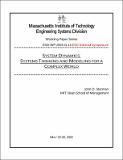| dc.description.abstract | Todays problems often arise as unintended consequences of yesterdays solutions. Social systems often suffer from policy resistance, the tendency for well-intentioned interventions to be defeated by the response of the system to the intervention itself. The field of system dynamics, created at MIT in the 1950s by Jay Forrester, is designed to help us learn about the structure and dynamics of the complex systems in which we are embedded, design high-leverage policies for sustained improvement, and catalyze successful implementation and change. Drawing on engineering control theory and the modern theory of nonlinear dynamical systems, system dynamics often involves the development of formal models and management flight simulators to capture complex dynamics, and to create an environment for learning and policy design. Unlike pure engineering problems if any exist, human systems present unique challenges, including long time horizons, issues that cross disciplinary boundaries, the need to develop reliable models of human behavior, and the great difficulty of experimental testing. Successful change in social systems also requires the active participation of a wide range of people in the modeling and policy design process, people who often lack technical training. In this paper I discuss requirements for the effective use of system dynamics and illustrate with a successful application to a difficult business issue. | en_US |
